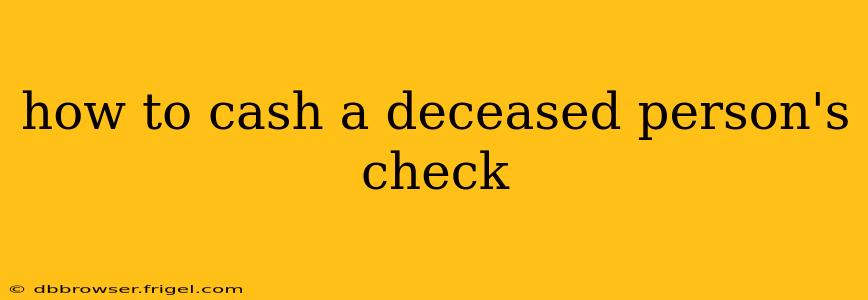Cashing a check written to someone who has passed away requires careful attention to legal and financial procedures. It's a sensitive situation, and understanding the correct steps is crucial to avoid complications and potential legal issues. This guide outlines the process, addressing common questions and concerns.
What Happens to Checks After Someone Dies?
After a person dies, their assets, including outstanding checks payable to them, become part of their estate. These checks cannot be simply cashed by a family member or friend. Attempting to do so could be considered fraudulent. The executor or administrator of the estate, appointed by the court (or named in a will), is legally responsible for managing and distributing the deceased's assets, including cashing these checks.
How to Properly Cash a Deceased Person's Check
The process involves several key steps:
-
Locate the Will (if any): The first step is to determine if the deceased had a will. The will names an executor who has the legal authority to manage the estate's affairs.
-
Contact the Executor or Administrator: The executor or administrator is the legal representative of the estate and is the only person authorized to cash the check. You will need to contact them and provide the check.
-
Estate Probate: If there's a will, it undergoes probate—a legal process where the will's validity is confirmed, and the executor's authority is established. If there's no will (intestate), the court appoints an administrator. This process can take time.
-
Endorsement of the Check: The executor or administrator will endorse the check on behalf of the estate. The endorsement usually includes wording specifying the estate's name and the executor's capacity (e.g., "Estate of [Deceased's Name], by [Executor's Name], Executor").
-
Depositing the Check: The endorsed check is then deposited into the estate's bank account. This account is typically opened specifically for managing the estate's funds.
-
Distribution of Funds: Once the estate is settled, the funds from the cashed check, along with other assets, are distributed to beneficiaries as per the will or the intestacy laws of the jurisdiction.
What Documents Are Needed?
The executor or administrator will typically need various documents to handle the check and the estate's finances. These often include:
- Death certificate: Proof of the deceased's death.
- Will (if applicable): The legal document outlining the deceased's wishes for the distribution of assets.
- Identification of the executor or administrator: Proof of their legal authority to manage the estate.
- The check itself: The check payable to the deceased.
Can I Cash a Deceased Person's Check Without Probate?
In some limited circumstances, small estates might avoid formal probate. However, even in these cases, proper legal procedures must be followed. Simply cashing the check without proper authorization is illegal. Seek legal advice if you're uncertain about probate requirements.
What if the Check is Made Out to Multiple People and One is Deceased?
If a check was made payable to multiple payees, and one has passed away, the surviving payee(s) can usually endorse the check and cash it. However, if the deceased was a joint account holder, the surviving holder might need to provide documentation confirming their right to the funds.
What if the Check is Lost or Stolen?
Report the lost or stolen check to the issuing bank immediately. They will likely issue a stop payment order and reissue the check. The executor or administrator will then follow the usual process of endorsing and depositing the new check.
Seeking Professional Help
Navigating the legal aspects of handling a deceased person's assets can be complex. If you are unsure about any aspect of this process, consulting with an attorney or estate planning professional is strongly recommended. They can provide expert guidance and ensure all legal requirements are met. Remember, attempting to circumvent the proper procedures can lead to serious legal consequences.
